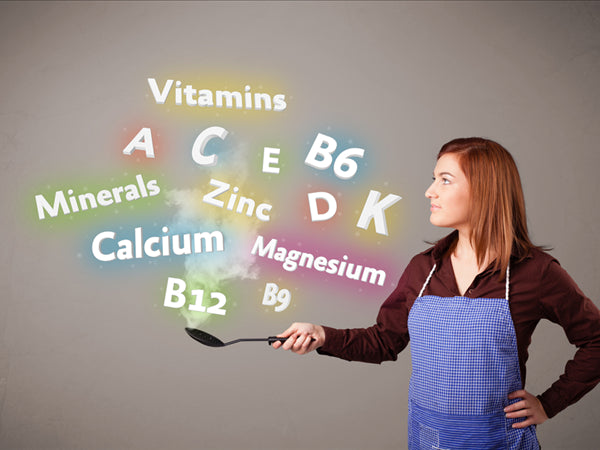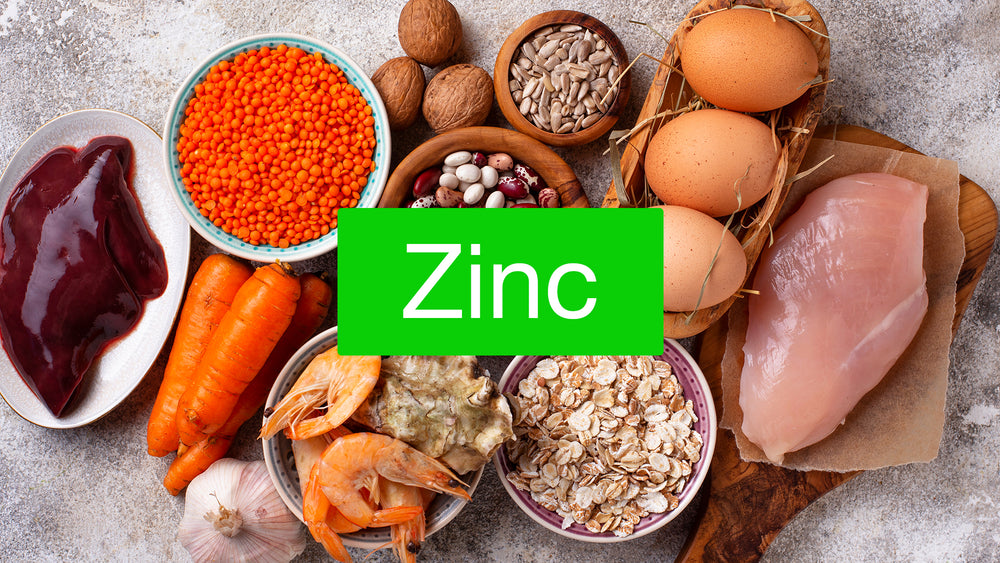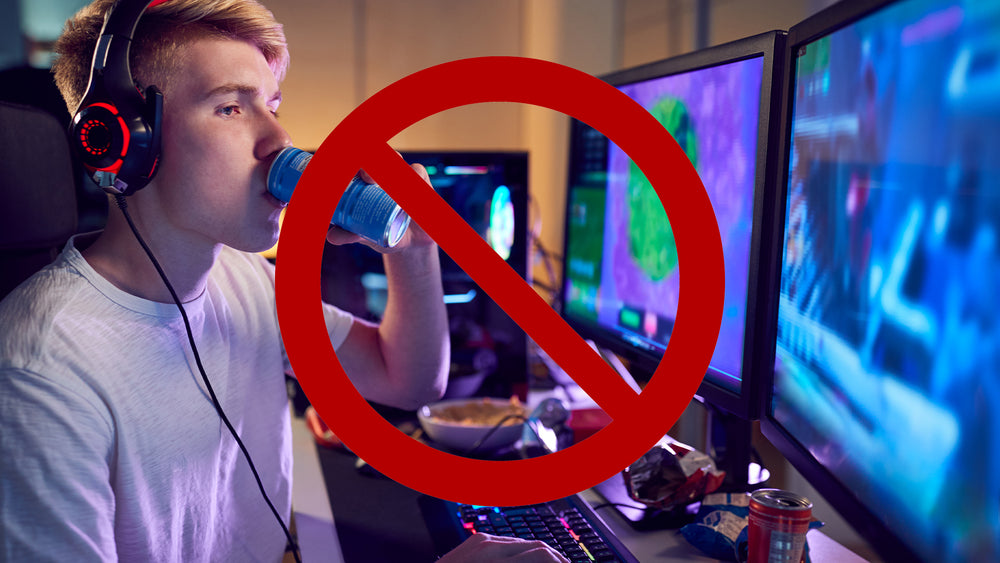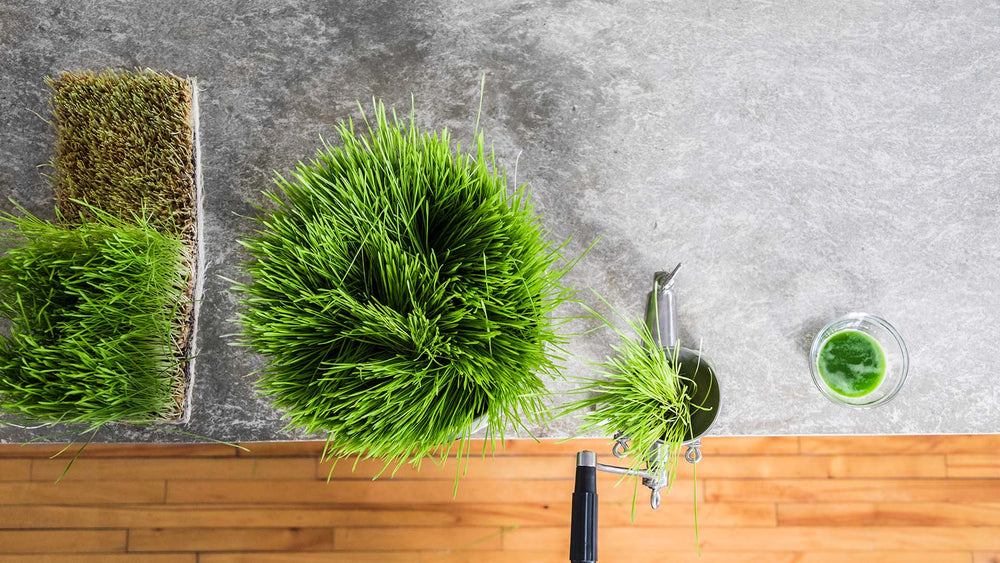Nutrition is one of the building blocks of good health, along with exercise, proper sleep and positive. Eating well is more important than ever when you're feeling stressed.
Ironically, when we're stressed out we may turn to fast food, eat too much of the wrong things, or not eat much at all, which fuels stress instead of a return to balanced thinking. Keep calm even in tough situations by taking minerals and vitamins for stress – and eating nutritious foods on a daily basis. By planning meals and bringing healthy snacks with you to work or school, you prevent mood swings and handle stress much better. Keep anxiety under control the natural way.
Vitamin C Fights Colds, Cancer and Stress
The inflammation-reducing powers of Vitamin C are usually linked with preventing the common cold and destroying free radicals that damage cells. Research now shows that Vitamin C decreases the mental and physical effects of stress. People with high levels of Vitamin C don't “fall apart” at stressful moments; they are able to regain their composure and think clearly instead of panicking. The stress hormone cortisol and high blood pressure increase in individuals facing exams, job interviews and other stressful situations. A high intake of Vitamin C (but not too high), will help people remain calm. According to the University of Maryland Medical Center, taking 500 to 3,000 mg a day of Vitamin C can reduce negative reactions to stress. Lower the dose if diarrhea develops.1
Vitamin D – The Sunshine Vitamin Offers Stress Relief
Along with calcium, Vitamin D contributes to healthy bones, keeping them strong. Vitamin D is the sunshine vitamin – we get most of it from direct sunlight. It's recommended that most people get about 20 minutes of direct sunlight a day to receive an adequate amount of Vitamin D. However, most Americans, especially older adults, don't get enough Vitamin D. Insufficient amounts of this vitamin may cause depression, stress and decreased mental function. Prolonged Vitamin D deficiency may lead to Alzheimer's disease.
Even if you get enough Vitamin D from sunlight and foods such as fortified milk, you still need to get restful sleep to process Vitamin D. A fragmented or graveyard shift sleep schedule (or other issues) may increase the stress hormone cortisol in your body.2 To manage stress, take a Vitamin D supplement (or consume more beef liver, salmon or cod liver oil), get out in the sun more, and get seven to nine hours of sleep each night.
Eat Vitamin Rich Foods to Stay Calm
Alleviate stress by stocking your kitchen with plenty of anti-stress foods. Incorporate these whole grains, fruits and veggies into your diet to stay calm and focused during hectic times.
Asparagus – Anxiety and depression are linked to low levels of folate (Vitamin B9). A cup of asparagus provides 67% of the daily recommended value of folate.
Asparagus also contains fiber and a carbohydrate called inulin to support better digestion. Inulin isn't broken down during the first stages of digestion, this carb passes undigested to the large intestine, where it becomes a food source for bacteria that provide better nutrient absorption. Include asparagus tips in your breakfast omelet or as a side dish with fish or poultry.
Almonds – Munch on a handful of almonds when you're stressed out to get some calming nutrients. Packed with Vitamin B2 and magnesium, almonds also contain Vitamin E to fight free radicals, which lead to stress and heart disease. Instead of eating whole almonds, you can spread almond butter on whole wheat bread or whole grain crackers.
Blueberries – Like apples, blueberries are high in fiber and antioxidant-rich Vitamin C, which doubles as a stress buster. They have high levels of anthocyanin, an antioxidant that boost cognitive function, and fight insomnia, depression and other mood disorders. Add blueberries to cottage cheese for an anxiety-relieving snack
Salmon – The Omega 3 fatty acids in salmon are best known for promoting a healthy cardiovascular system, but they also regulate cortisol and adrenaline, two important stress hormones. Salmon and other oily fish are brain food, so it really is an all-purpose food for improved mood and cognitive function. Eating salmon or tuna and other fish containing Omega 3s two to three times a week is recommended to regulate stress and keep your heart strong.
Turkey – Tryptophan, a calming amino acid, is found in turkey. It causes the brain to release serotonin, a chemical promoting serenity, and in large amounts, sleepiness. The tryptophan in turkey is what makes you so tired after a big Thanksgiving dinner. Pack a turkey sandwich if you're due for a stressful day at work – it will help you to stay calm.
When you're under stress, you may be tempted to grab a bag of Doritos, a candy bar or other food that's prepackaged and easily available. Instead of buying chips or sweets from the vending machine or convenience store, get sunflower seeds or nuts. Bring stress-fighting fruit and a tuna or turkey sandwich for lunch.
Get More Magnesium to Fight Stress
The average American diet is sadly lacking in magnesium, a vital nutrient for controlling stress. A study conducted by Great Smokies Diagnostic Laboratory, in Asheville, N.C. shows that “Mg deficiency increases susceptibility to the physiologic damage produced by stress…”, so getting enough magnesium through food and supplements is crucial for combating stress and its aftereffects.3 A 1968 study by the New England Journal of Medicine linked magnesium deficiency with “Anxiety, depression, headaches, restlessness and irritability.” Stress contributes to high blood pressure, stroke and heart disease, conditions. Some people need medication to control stress and the cardiovascular problems it causes. Others can control or prevent stress through proper nutrition and lifestyle choices.
The recommended daily allowance for magnesium is between 320 and 420 mg; most Americans only get around 250 mg. Even a slight magnesium deficiency can interfere with biochemical processes throughout the body. Magnesium is stored in your bones and it helps cells create energy. You need a sufficient amount of magnesium for muscles, including the heart, to function properly. If you have a consistently poor intake of magnesium, you may experience muscle cramps or arrhythmia (irregular heartbeat). People with a low level of magnesium in their bodies find that stressful situations impact their cognitive ability and cardiovascular and nervous systems to a much greater extent than people with an adequate or high level of magnesium.
You can get magnesium through food sources including broccoli, spinach, blackberries, watermelon, buckwheat, cashews, shrimp, lima beans and green beans – or the most powerful magnesium-filled food of them all, wheatgrass.
Wheatgrass is Fueled by Magnesium-Rich Chlorophyll
Wheatgrass is one of nature's true superfoods – and it contains an abundance of magnesium. The amount of this phytochemical in wheatgrass can help make up for the lack of magnesium in the average diet. Although most people have heard about wheatgrass, there may be some confusion about what it is and what it does.
Wheatgrass juice and wheatgrass supplements are made from a young form of the plant, Triticum aestivum. You can grow wheatgrass indoors or outdoors by soaking seeds in water and picking them as they sprout. Juicing at home takes practice and can get messy. Many health clubs and juice bars serve wheatgrass shots, but even though these drinks are filled with nutrients, the taste is unpleasant to most people and may cause nausea. That's why taking a wheatgrass supplement, or tablet, is a better choice for most health-conscious folks.
Wheatgrass contains stress-busting magnesium, vitamins C, B12, B6, plus iron and zinc. The list of important nutrients in wheatgrass goes on and on. It has essential amino acids, including stress-relieving tryptophan, tyrosine and phenylalanine. These amino acids are called catecholamines, and they have adrenaline-like effects similar to dopamine and other neurotransmitters. Phenylalanine, tryptophan and tyrosine have a calming effect and improve memory. They may be helpful reducing or preventing conditions that cause Parkinson's and memory loss.4
Too much stress can undermine your body's pH level, making it more acidic and causing other health problems, including ulcers, high blood pressure and migraines. Taking a wheatgrass supplement will balance your body's pH, reducing the effects of anxiety on mental and physical health. Ideally, you body should have a somewhat alkaline pH balance of around 7.4.
B- Complex Vitamins Curb Work-Related Stress (And Other Kinds, Too!)
Have you ever dreaded going to work- or facing a customer or client if you're self-employed? If so, you're not alone; work related stress is one of the biggest causes of anxiety and depression, not to mention sick days. Unless you win the lottery and quit your job, you'll need to learn how to deal with anxiety.
An Australian study showed that individuals who took B-complex vitamins felt less stressed and depressed during the research, while people given a placebo showed no difference in stress levels. And B-complex vitamins guard against stress regardless of the cause, so if it's your home life or the daily commute that's stressing you out, B-complex vitamins will help with those anxiety-boosters as well.
Folic acid (Vitamin B9), Vitamin B6 and Vitamin B12 are essential for better mental function, and taking a multivitamin or supplement containing B-complex vitamins will help you deal with life's stressors. Folic acid, B12 and B6 increase the level of serotonin, dopamine and other critical hormones in the brain. These hormones enhance mood, keeping you happier and calmer during trying times. Vitamin B12 deficiency causes fatigue and anemia in addition to lowering your defenses against stress, so it's important to get enough of this vitamin from all possible sources (supplements/food). All B-complex vitamins reduce the level of the amino acid homocysteine, which contributes to Alzheimer's disease. B-complex vitamins are available from many food sources, including eggs, cheese, shellfish, red meat and fortified cereals. Wheatgrass contains all B-complex vitamins, including stress-fighting B6, B12 and folic acid.
Antioxidant-Rich Green Tea Reduces Stress with Every Cup
With several powerful antioxidants, including flavonoids, polyphenols, and catechins, to keep you in a positive mood, green tea is one of the most powerful stress-fighting foods in your arsenal. It also contains the amino acid L- theanine to sharpen cognitive function. One study indicated that people who drink five cups of green tea a day were happier and more focused than people who drank less than a cup per day. Green tea, while not unpleasant, may taste bitter to some folks (especially if it has been steeped for too long), so you can substitute black tea instead. Black tea contains antioxidants, but it's not as potent as green tea. If you like the taste of green tea, 2-3 cups a day should be enough to keep stress in check.
Get Vitamins for Stress, Wheatgrass and Other Important Minerals with Happy Girl, REVV and Zeal O2
Stop stress before it ruins your life and your health by eating foods with vitamins for stress and taking a wheatgrass supplement from Wheatgrass Love. We offer three wheatgrass products to accommodate different needs. Our Happy Girl Mood Enhancer is tailor-made to reduce stress and keep you in a good mood to deal with life's challenges. If you suffer from occasional mild to moderate anxiety, Happy Girl, with its blend of wheatgrass and stress-fighting herbs like cayenne pepper and green tea extract, will balance mood swings and keep you focused. Happy Girl is great for men and women, and can be used daily without side effects, unlike prescription antidepressants. Read more about Happy Girl.
For a quick burst of energy, try delicious-tasting REVV chocolate wafers. Made with cocoa, L-taurine, caffeine, periwinkle herb and wheatgrass, this all-natural supplement gives you a healthy rush of energy in minutes so you can focus better and feel great! Order REVV.
If you need to lose weight or maintain your current weight, Zeal O2 Weight Loss Supplement does more than curb your appetite. It provides all the amino acids, enzymes and vitamins wheatgrass has to offer, plus ginkgo biloba, white willow, green tea extract, ginger, Siberian ginseng, fo-ti and other herbs to keep you strong and focused for your day's activities, even when you're counting calories. Read more about Zeal O2.
If you have any questions about WheatgrassLove products, we're here to help! Call us at 877-303-1717 or read about our company here: http://wheatgrasslove.com/about/company
- http://umm.edu/health/medical/altmed/condition/stress
- https://www.naturalmedicinejournal.com/journal/2010-06/role-cortisol-sleep
- http://www.ncbi.nlm.nih.gov/pubmed/1844561
- http://www.now-university.com/088747.htm
















